Transcaucasian massacre
In the Transcaucasus, after the death of the Russian Empire and the collapse of the Caucasian Front, which successfully fought against the Turkish army, the unrest had its own local character. Here the civil war immediately acquired an interethnic character. Almost simultaneously, several centers of power and power emerged, some of which relied on external forces.
After October, the Transcaucasian Commissariat, the coalition government created in Tiflis with the participation of the Georgian Mensheviks, Social Revolutionaries, Armenian Dashnaks and Azerbaijani Musavatists, took power into the territory of the Transcaucasus. At the beginning of 1918, the Transcaucasian Commissariat decided to convene the Transcaucasian Seym as the legislative body of the Transcaucasus. The Transcaucasian Commissariat refused to recognize the power of the Soviet government and extended its authority to the whole of Transcaucasia. In addition to the area of Baku, where Soviet power was established. The Baku Council of People's Commissars (“Baku Commissars”) was headed by the Armenian Bolshevik Stepan Shaumyan. However, in Baku, the positions of the Bolsheviks were weak, they constituted a minority in the city council and were supported only by the Left Social Revolutionaries. The Bolsheviks held power only with the consent of the Right Socialist-Revolutionaries, Mensheviks and Dashnaks.
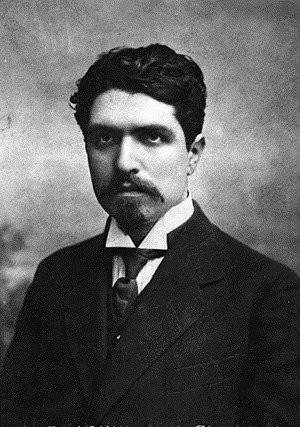
Chairman of the Baku Council of People's Commissars (SNK) Stepan Georgievich Shaumyan (1878 - 20 September 1918)
Meanwhile, Turkey continued its intervention, even before the war, having plans to include the Caucasus in the empire. In February 1918, the Turks took Erzincan, Bayburt, Trapezund and Mamahatun. The invaders were confronted mainly by Armenian troops. Armed Muslim troops went over to the Turks. The Transcaucasian Commissariat avoided participation in the negotiations in Brest and entered into negotiations in Trabzon with Turkey. The Turkish government has requested the Transcaucasian Seym - does the Transcaucasian republic recognize itself as part of Russia? If yes, then according to the Brest peace the republic should give up Kars, Batum and Ardahan. The Transcaucasian Seym rejected these demands. Then the Turks continued the offensive. On April 15, the Turkish army occupies the Batumi fortified area, and by April 25 Kars and Ardahan. The Seimas of April 22 declared the Transcaucasian Democratic Federative Republic (ZDFR) independent. The Transcaucasian government redeployed the troops to the 1877 — 1878 before the Russian-Turkish war. border along the rivers Cholok and Arpachay. Despite this, the Turkish army continued its offensive against Tiflis, Erivan and Julfa. The Turks have now put even more stringent conditions - to give half of the Erivan, Tiflis and Kutaisi provinces.
Thus, a new large massacre of the Christian (Armenian, Georgian and Russian population) in the Caucasus was brewing. There was no one to defend against the regular Turkish army, apart from the Armenian and Georgian partisan detachments, a few Russian volunteers. One of the most combat-ready units was the Andranik division. The Muslim part of the Diet and its troops were clearly leaning toward Turkey.
The onset of the Turks in the Caucasus in the year 1918. Map source: https://ru.wikipedia.org/
The Georgians found a way out to go under Germany. In Berlin, they also wanted to get a strategic bridgehead in the Caucasus. General Ludendorff wrote: “For us, a protectorate over Georgia was a means ... to get access to Caucasian raw materials. We could not trust Turkey in this regard. We could not count on Baku oil if we did not get it ourselves. ” April 27 Berlin 1918 forced Turkey to conclude in Constantinople a secret agreement on the division of spheres of influence. The Turkish empire was allotted the territory of Georgia and most of Armenia that it had seized, the rest of the Transcaucasus fell under the control of Germany. On April 28, at the request of Germany, Turkey announced an agreement to begin peace negotiations with the government of the RFPU, which began on May 11 in the city of Batum. On the other hand, 14 May The Georgian National Council appeals to Germany for patronage. In response, Berlin, which had already seized the Russian Black Sea ports by that time, agreed to assist Georgia. Germany “rented” Poti from the Georgians for 60 years and received a monopoly on the exploitation of Georgia’s resources.
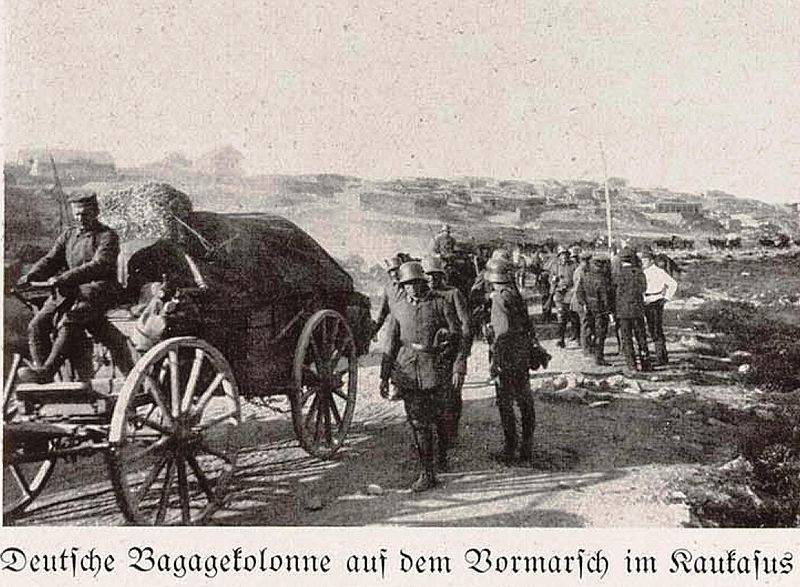
German troops in the Caucasus
25 May from the Crimea in Poti arrived first echelon of the German troops (in June, the Germans occupied Tiflis and other Georgian cities). On the same day, on the night of May 26, the Georgian faction of the Transcaucasian Sejm decides on Georgia’s withdrawal from the federation, and the Georgian National Council proclaims the creation of the Georgian Democratic Republic. At the same time, the Turkish delegation in the city of Batum presents an ultimatum on the elimination of the RFFF. 28 May in connection with the actual collapse of the ZDFR in Tiflis, the Provisional National Council of Azerbaijan proclaims the creation of the Azerbaijan Democratic Republic. On the same day in Tiflis, the Armenian National Council proclaimed the creation of the Democratic Republic of Armenia. From this point on, the Armenian and Georgian delegations conducted negotiations with the Turks separately.
Thus, instead of one Transcaucasian republic there are three - Georgia, Armenia and Azerbaijan. These weak and loose state formations could not exist independently, only with the support of external forces. 4 June 1918 Turkey signed “peace and friendship” treaties with Armenia and Georgia, according to which the Turkish Empire, apart from the Kara, Ardahan and Batumi regions, departed: Akhalkalaki district and part of Akhaltsikhe district from Georgia; from Armenia Surmalinsky district and part of Alexandropol, Sharur, Echmiadzin and Erivan counties. The territory of the Republic of Armenia was limited to Erivan and Echmiadzin counties. The rest of Armenia, including Western Armenia, was invaded by Turkish troops.
In the same period in Dagestan, Imam Najmudin Gotsinsky declared himself a descendant of Shamil and, together with the "prophet" Uzun-Haji, declared jihad, a holy war against the infidels. Having gathered a large army from the highlanders, they occupied Temir-Khan-Shura (Buinaksk), and on March 23 they knocked out the Reds from Petrovsk (Makhachkala). The Reds fled to Astrakhan (on steamboats) and to Baku (by rail). At that time, the headquarters and the remains of the "Wild Division" were in Baku. They loaded onto steamboats and planned to return to the North Caucasus. The Baku Council of People's Commissars under the slogan of "Muslim threat" carried out a coup. The commissars gathered red units escaping from Dagestan, attracted the Armenian detachment of T. Amirov (returned through Baku from Persia), connected the Caspian sailors flotilla (Socialist-Revolutionaries predominated there), Red Guards from the oil fields. The remnants of the "Wild Division" were beaten or disarmed. Then they began to smash the Muslim quarters. The massacre of local Muslims, Tatars (as Azerbaijanis were then called) began.
Gotsinsky mountaineers marched to Baku from the north, and Ziyatkhanov Bek from the south. Ziyatkhanov was crushed in Shemakha. In total, several thousand Muslims were killed in Baku and Shamakhi. The Baku Council of People's Commissars launched an offensive to the north and defeated the highlanders, took Petrovsk. There came the ships with troops from Astrakhan. Imam Gotsinsky threw thousands of highlanders into the city. They were brave warriors, but poorly armed, without experienced commanders. With cold weapons went on the attack in dense crowds, as in the Middle Ages. They were literally shot by volleys of ship and field artillery, from machine guns. Jihad drowned in blood. Imam went to the mountains. The Reds beat off Temir-Khan-Shura.
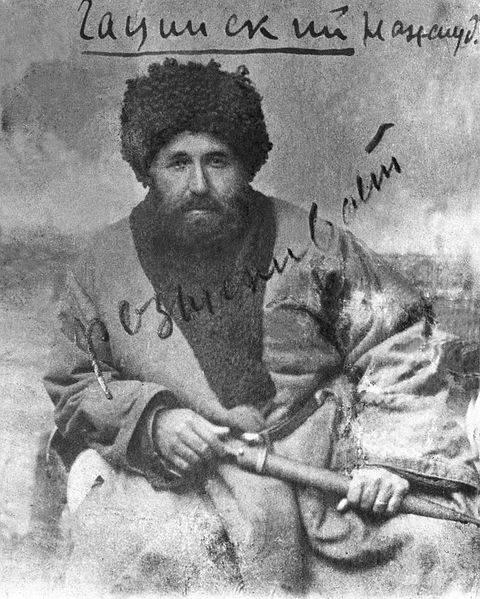
Nazhmudin Gotsinsky (1859 - 1925)
Meanwhile, blood flowed between the Black and the Caspian Sea, massacres and anarchy unfolded. Gangs of Ziyatkhanov and other Beks invaded Mugan, populated by Russian peasants. The bandits destroyed dozens of villages, 30 thousand people fled to Baku and Russia. But the southern part of the region managed to organize, to create a self-defense detachment under the command of Colonel Ilyashevich. The militias were able to break the bandits, they themselves destroyed several Muslim villages. As a result, they created the Mugan Soviet Republic (Lankaran Soviet Republic), which existed for a year. Only in the summer of 1919, did Azerbaijani troops occupy Lankaran.
Muslim detachments also attacked Armenian Karabakh. And here war and massacre began. The Armenians created the Karabakh-Zangezur Republic. She was defended by a detachment of General Andranik, who did not recognize the peace concluded between the Turks and the Armenian government. On July 14, Andranik sent a telegram to Baku that the Nakhichevan district "declared itself an integral part of the Soviet Republic," and with his detachment he transferred to the disposal and subordination of the Soviet government. July 19 Turks occupied Nakhichevan and Julfa. Andranik had to retreat to the mountains of Zangezur with a large number of refugees.
In Nakhichevan, there was the Araxian Republic, created by the Turkic khans, who organized the genocide of the Armenian population and hated Russia, which once deprived them of their feudal rights. In Ganja (Elizavetpol), the central government of Azerbaijan is located, relying on the liberal party Musavat (Equality). Pan-Turkic sentiments prevailed here and saw the patron in Turkey. The Muslim formations created under the Provisional Government collapsed with Russian officers. Therefore, the government relied squads and gangs bekov. In June 1918, the Azerbaijan Democratic Republic (ADR) and the Ottoman Empire signed a friendship agreement. Turkey pledged to assist the armed forces to the government of Azerbaijan "to ensure order and security in the country." As a result, the Caucasian Islamic Army (or the Army of Islam) was formed as part of the corps of Azerbaijani and other Caucasian irregular units and Ottoman regular troops under the command of Nuri Pasha (the stepbrother of the Turkish leader Enver Pasha).
The worst situation was in Armenia. Armenian troops stopped the Turks just a few kilometers from Erivan. The Republic of Armenia was limited to Erivan and Echmiadzin counties, which was 12 thousand km² with a population of about 1 million (more than half were refugees). The remaining Armenian lands were invaded by Turkey. A small area of barren mountains could not feed the population of the republic. There were enemies from all sides: the Turks from the west, the Kurds from the south, the Muslim Arak and Azerbaijan republics from the south-east and east. From the north - “Georgian brothers”, who did not even let in food to the starving Armenians. The Georgians quickly occupied all the disputed territories and declared that the Armenians could not constitute any viable state, therefore it is beneficial for them to strengthen Georgia to create a strong Christian state in the Caucasus, which with the support of Germany will protect both Georgians and Armenians. The Russians in Armenia were treated well. There were happy Russian specialists, especially the officers. In Russia, they saw a force that could save Armenia, so they tried to establish contacts with both white and red.
Georgia, while maintaining independence with the help of the Germans, has proved extremely aggressive, pursuing a nationalist policy. Georgian troops under the leadership of Dzhungeliya (about 10 thousand people) began to "round off" the territory of the republic at the expense of small nations - Ossetians, Adzharians, Lezghins, Armenians, Muslims (national minorities made up more than half of the population of Georgia). At the same time, the former well-known Russian Social Democrats, the leaders of the revolution Tsereteli, Cheidze, Zhordania, showed themselves as ardent nationalists, in fact Nazis. They sowed hatred for everything Russian, although it was thanks to the Russians and Russia that Georgia and the Georgians survived as a country and a people. Thousands of Russians living in Georgia were deprived of work, civil rights, and imprisoned. Russians were expelled to the ports of the Black Sea or along the Georgian Military Highway. Thus, the nationalist and Russophobic line of Georgia after the collapse of the USSR only repeated the policy of the Georgian leadership during the Civil War.
In April, the Reds entered Abkhazia. The local national council asked for help from Georgia. The fighting of the Georgian army, created with the help of German instructors, with the red ones began. Georgian General Mazniyev (lieutenant colonel of the Russian Imperial Army) defeated the Reds and captured Abkhazia. The Georgians continued the offensive and captured Gagra, Sochi and Tuapse. In Abkhazia, the Georgians dispersed the local council, arrested its members and imprisoned their governor-general. In the Sochi district, which they did not hope to join to Georgia, they looted all state property - they took out the rails of the Tuapse railway, various equipment, stole cattle, etc.
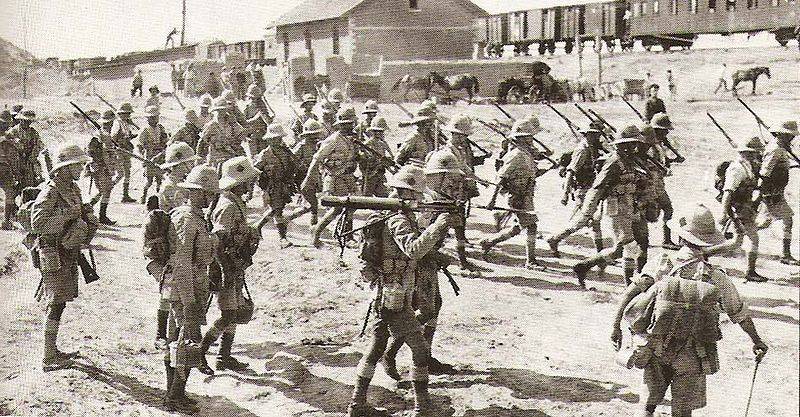
British troops on their way to Baku. 1918
To be continued ...
- Alexander Samsonov
- Smoot. 1918 year
How to create a volunteer army
How the battle for the Don began
"Your talk is not needed by the working people. The guard is tired!"
100 years of the Workers 'and Peasants' Red Army and Navy
Who incited the Civil War
White fought for the interests of the West
Anti-Russian and anti-state white project
How "Ukrainian Chimera" incited the Civil War
How to create Ukraine and the "Ukrainian people"
How the red took Kiev
Victory of the Red Army on the Don
Bloody Battle of the Ice Campaign
How Kornilov stormed Ekaterinodar
Destined to die? Died with honor!
People against power
How Drozdovtsy broke through on the Don
How drozdovtsy stormed Rostov
Don Republic Ataman Krasnov
West helped the Bolsheviks?
Why did the West support both red and white?
Why do Czechoslovak murderers and looters erect monuments in Russia
Second Kuban campaign
Eastern Front Education
Why did they kill the Russian tsar?
Rise of the Left Social Revolutionaries and its weirdness
How white occupied the capital of Kuban
Bloody battle for Yekaterinodar
Kappelevtsy take Kazan
"For the Soviets without the Bolsheviks"
The landing of the British in Arkhangelsk. Formation of the Northern Front
The heroic campaign of the Taman army
Why tried to kill Lenin
Soviet republic turns into a military camp
How terror flooded Russia
The first battle for Tsaritsyn
Red Army beats off Kazan
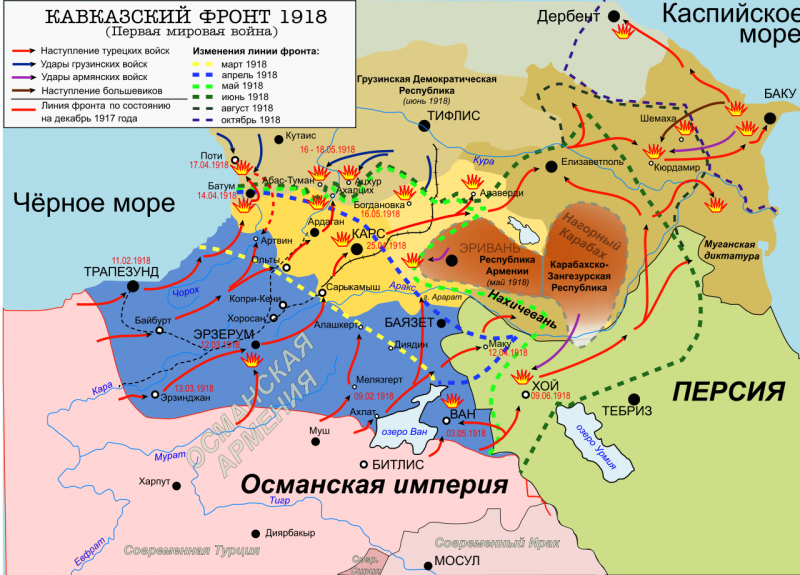
Information